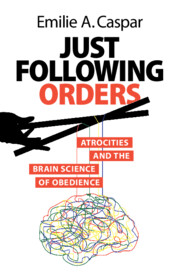Just Following Orders
How can obedience and carrying out orders lead to horrific acts such as the Holocaust or the genocides in Rwanda, Cambodia, or Bosnia? For the most part, it is a mystery why obeying instructions from an authority can convince people to kill other human beings, sometimes without hesitation and with incredible cruelty. Combining social and cognitive neuroscience with real-life accounts from genocide perpetrators, this book sheds light on the process through which obedience influences cognition and behavior. Emilie Caspar, a leading expert in the field, translates this neuroscientific approach into a clear, uncomplicated explanation, even for those with no background in psychology or neuroscience. By better understanding humanity's propensity for direct orders to short-circuit our own independent decision-making, we can edge closer to effective prevention processes.
- Presents the first complete and interdisciplinary view on the mechanisms of obedience
- Combines lab research with field work and interviews with genocide perpetrators
- Translates rigorous research into an easy-to-understand explanation of atrocious acts from a human-centred perspective
Reviews & endorsements
'The reason sentient human beings are able to commit atrocities they recognise as such is that direct orders circumvent individual decision-making. This mental quirk, says the neuroscientist Emilie A Caspar, is why genocide - from the Holocaust to Rwanda - happens. Her book is a lucid study of the 'brain science' of obedience and its consequences.' New Statesman
Product details
August 2024Adobe eBook Reader
9781009385404
0 pages
This ISBN is for an eBook version which is distributed on our behalf by a third party.
Table of Contents
- Introduction: understanding genocide as a means to prevention
- 1. Listening to the perpetrators of genocide
- 2. A brief history of the experimental research on obedience
- 3. How do we take ownership and responsibility over our own actions?
- 4. Moral emotions under obedience
- 5. Just giving orders? In the brain of those who command
- 6. Desolation is everywhere
- 7. Conclusion: How ordinary people stand up against immorality
- Epilogue: A hopeful horizon.






